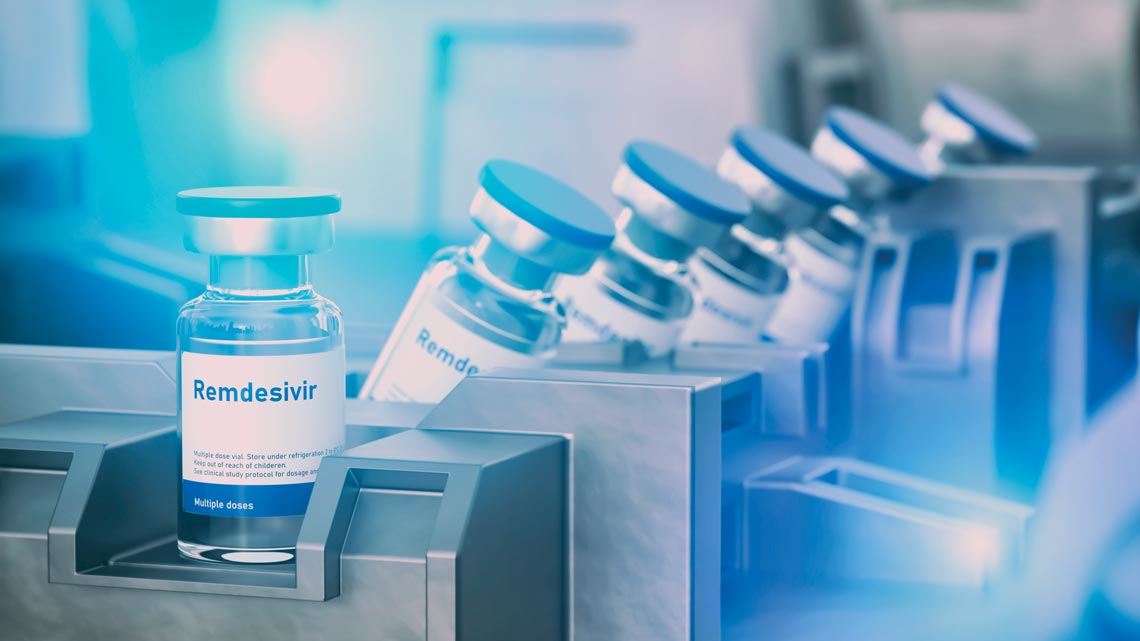Between March and May this year, the Brazilian Health Regulatory Agency (ANVISA) authorized the emergency use of three COVID-19 medications. One is an antiviral called remdesivir, developed by Gilead Sciences, and the other two are monoclonal antibody combinations: REGEN-COV, made by Regeneron and Roche, and bamlanivimab/etesevimab, by Eli Lilly. All are costly and indicated for very specific and limited situations, only for patients over 12 years old who weigh more than 40 kilos and are at risk of severe cases of the disease. They are not universal remedies capable of controlling the pandemic or treating COVID-19 preventively. The price of the drugs will be defined by the Brazilian Drug Market Regulation Board (CMED) and they have not yet been used by the Brazilian public health system (SUS) or private hospitals.
The first of the three drugs, the antiviral remdesivir, which prevents the SARS-CoV-2 virus from replicating in the body and reduces the average time patients spend in hospital, was approved on March 12. Originally developed in 2009 to treat other infections, such as hepatitis C and respiratory syncytial virus (RSV), the medication was also tested unsuccessfully on the Ebola virus. ANVISA spent six months analyzing studies conducted abroad on COVID-19 patients given remdesivir, which has already been approved by the USA, Japan, Israel, and the European Union. The drug was authorized in Brazil for people infected with SARS-CoV-2 who contract pneumonia and need to be given additional oxygen. It cannot be given, however, to patients who are intubated or connected to a mechanical respirator.
“It is only for use in hospital settings, it will not be possible to buy it at pharmacies. It is administered intravenously and treatment can last for up to 10 days,” says Sergio Cimerman, scientific coordinator of the Brazilian Society of Infectious Diseases and a physician at the Emílio Ribas Institute of Infectious Diseases in São Paulo. “But the results are consistent,” he explains. The World Health Organization (WHO), however, is not convinced of the benefits and does not support the use of remdesivir against COVID-19. In the USA, the cost of a complete course of treatment with the drug, which usually involves six doses, is approximately US$3,000.
The other two approved treatments, which both use combinations of monoclonal antibodies, work similarly and have almost the same clinical recommendations. REGEN-COV, also known as REGN-COV2 in some markets, is composed of casirivimab and imdevimab antibodies. It was approved in Brazil on April 20, while the banlanivimab/etesevimab cocktail was approved on May 13. Both aim to bind to the spike protein of the novel coronavirus—which it uses to penetrate human cells and infect the organism—to neutralize the virus. They are recommended for patients with mild to moderate cases of COVID-19 who have not been hospitalized and do not need oxygen or a mechanical ventilator. Neither treatment will be sold in pharmacies. Their use is restricted to hospital environments, where they are administered intravenously.
The approved drugs are not suitable for universal use and are not enough to control the pandemic
According to infectious disease specialist Raquel Stucchi, from the School of Medical Sciences (FCM) at the University of Campinas (UNICAMP), monoclonal antibody treatments can be beneficial in certain situations. “They should be given early to patients with mild cases of COVID-19 who are at a greater risk of developing a more serious condition,” explains the doctor. “The elderly and people with comorbidities such as diabetes, obesity, and chronic diseases, for example.” According to Cimerman, although the data from phase 3 clinical trials have not yet been published, preliminary results from the emergency use of REGEN-COV are excellent. “It has reduced hospitalizations and deaths by 70%.”
Despite considering the use of monoclonal antibodies positive, the UNICAMP physician highlights a significant caveat. “Some studies show that monoclonal antibodies are less effective against the P1 variant of SARS-CoV-2 [which emerged in Manaus and spread throughout Brazil]. There are questions still to be answered. How useful will these drugs really be while P1 is circulating nationwide?” asks Stucchi.
The monoclonal antibodies approved by ANVISA can prevent targeted patients from developing more severe forms of the disease. But like remdesivir, they are very expensive. The cost of treatment with these drugs varies between R$20,000 and R$30,000. “It is impractical to assume that they will be available across the entire public network. Maybe they will reach selected hospitals,” says intensive care physician Luciano Cesar Pontes de Azevedo, from the School of Medicine (FM) at the University of São Paulo (USP) and Sírio-Libanês Hospital. Azevedo is part of a research group studying potential treatments for Covid-19. “We have already looked at hydroxychloroquine and the antibiotic azithromycin, neither of which work,” explains Azevedo. “Now we’re testing other drugs.”
There are currently no drugs capable of preventing COVID-19. Attempts to treat the disease in hospitals, often involving the use of corticosteroids to combat inflammation and anticoagulation in order to stop blood clots, have to adapt to new SARS-CoV-2 variants and unexpected aspects of the disease itself, which sometimes results in systemic problems. As such, Cimerman points out that it is essential to invest in immunization. “People need to be vaccinated, including against the flu,” says the infectologist. It is recommended to wait at least 15 days between getting the flu vaccine and the COVID-19 vaccine.
Republish